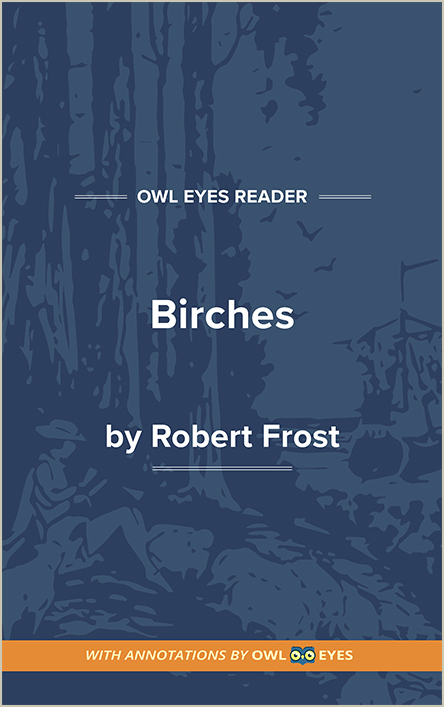Analysis Pages
Themes in Birches
The Conflict Between Fantasy and Reality: In the speaker’s stream of consciousness, two voices diverge and chatter along in a parallel tension. The first voice is that of fantasy; it longs for the woodland birches to stand as symbols of personal meaning. It assumes the birch trees were bent by a boy at play, a boy much like the speaker once was, glimpsing heaven in the exhilarating heights of the birches. The second voice is that of reality; it understands the “Truth” that the birches were bent by a storm and that any illusions otherwise are an indulgence. This voice’s “Truth” reaches much farther, however, for it knows that the glimpse of heaven high in the birches is merely a glimpse; one cannot escape the earth.
The Power of Memory: The speaker’s memories of childhood create a deeper layer of events and meanings in the narrative of the poem. Confronting the arching birches, the speaker is immediately reminded of his own childhood days spent swinging upon and bending birch trees. Because those childhood memories are so laced with bliss, the speaker, now laden with the responsibilities and difficulties of adult life, sees in his past the image of heaven. Looking at the birch trees afresh, he wonders whether such heaven remains available to him.
The Longing for Heaven and the Pull of Earth: The centrality thematic duality of the poem is that of heaven and earth. It is a tension which arises from the speaker’s boyhood memories of birch swinging, moments which were heavenly in their ascendent lightness and carefreeness. It is such a state of Edenic innocence the speaker longs for now as he strides the woods as an adult, freighted with the cares and sorrows of maturity. Gravity is the proper metaphorical force here, for the speaker feels weighed down toward the earth. The speaker strives to locate a resolution between his desire for heaven and his fate on earth.
Themes Examples in Birches:
Text of the Poem
🔒"One could do worse than be a swinger of birches...." See in text (Text of the Poem)
"both going and coming back. ..." See in text (Text of the Poem)
"But dipped its top and set me down again. ..." See in text (Text of the Poem)
"Toward heaven, till the tree could bear no more, ..." See in text (Text of the Poem)
"love: I don't know where it's likely to go better. ..." See in text (Text of the Poem)
"I'd like to get away from earth awhile And then come back to it..." See in text (Text of the Poem)
"bracken by the load,..." See in text (Text of the Poem)
"They are dragged to the withered..." See in text (Text of the Poem)
"You'd think the inner dome of heaven had fallen. ..." See in text (Text of the Poem)
"But swinging doesn't bend them down to stay As ice-storms do...." See in text (Text of the Poem)

